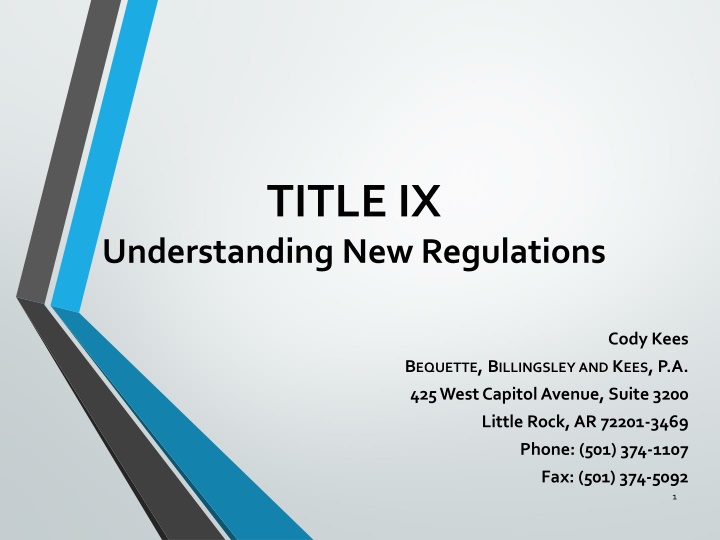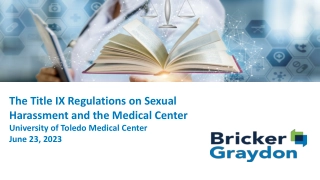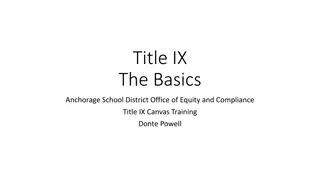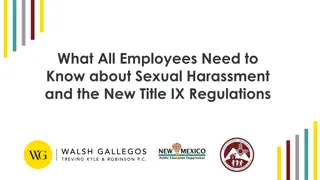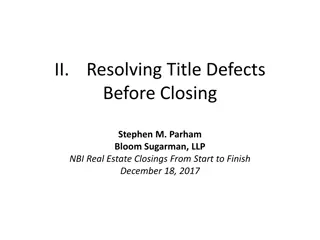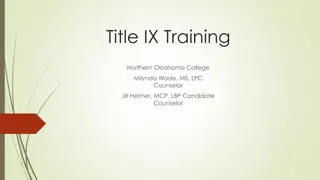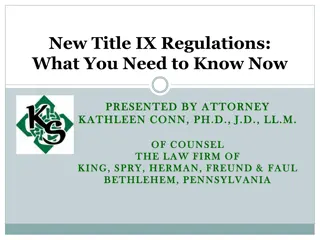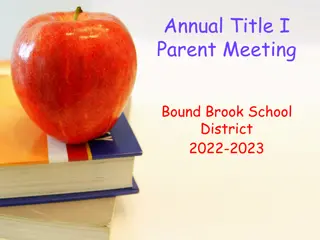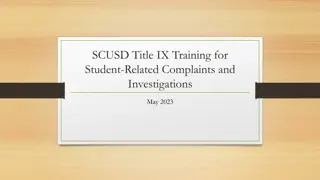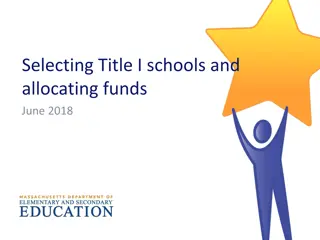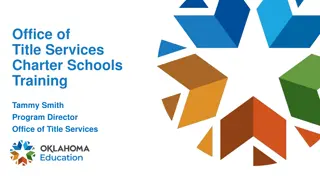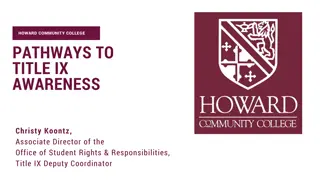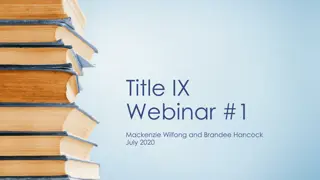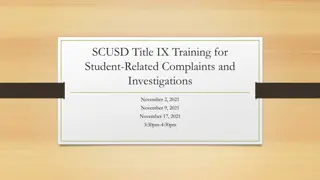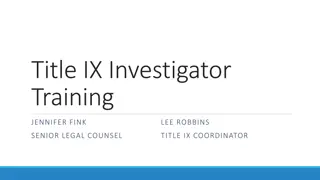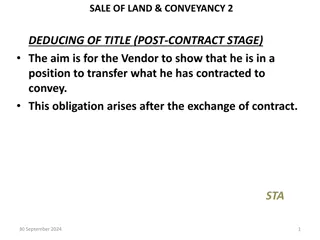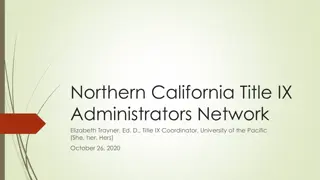Understanding New Regulations in Title IX
Title IX ensures no discrimination on the basis of sex in educational programs receiving federal financial assistance. The recent regulations effective from August 14, 2020, bring significant changes to Title IX management, including extensive training requirements. Despite concerns and lawsuits to delay the regulations, they have proceeded as planned. Examples of sexual misconduct outline unacceptable behaviors encompassed by Title IX.
Download Presentation

Please find below an Image/Link to download the presentation.
The content on the website is provided AS IS for your information and personal use only. It may not be sold, licensed, or shared on other websites without obtaining consent from the author.If you encounter any issues during the download, it is possible that the publisher has removed the file from their server.
You are allowed to download the files provided on this website for personal or commercial use, subject to the condition that they are used lawfully. All files are the property of their respective owners.
The content on the website is provided AS IS for your information and personal use only. It may not be sold, licensed, or shared on other websites without obtaining consent from the author.
E N D
Presentation Transcript
TITLE IX Understanding New Regulations Cody Kees BEQUETTE, BILLINGSLEY AND KEES, P.A. 425 West Capitol Avenue, Suite 3200 Little Rock, AR 72201-3469 Phone: (501) 374-1107 Fax: (501) 374-5092 1
Title IX No person in the United States shall, on the basis of sex, be excluded from participation in, be denied the benefits of, or be subject to discrimination under any educational program or activity receiving Federal financial assistance. Title IX of the Education Amendments of 1972 2
Title IX- very brief history of sexual harassment 1975- Department of Ed promulgated rules to enact Title IX; Sexual Harassment was never a consideration 1997- DoEd included sexual harassment under Title IX 1998 SCOTUS rules a educational entity is liable for Title IX teacher-on-student harassment if it is deliberately indifferent to actual notice of discrimination Gebser v. Lago Vista 1999- SCOTUS rules peer-on-peer harassment is actionable under Title IX Davis v. Monroe Bd. Of Ed. 2001- DoEd included interim measures to help victims 2011 and 2014- Additional guidance on sexual harassment that caused general confusion 2017- DoEd guidance on sexual harassment was rescinded Title IX of the Education Amendments of 1972 3
Whats the fuss? New Regulations take place August 14, 2020 US Department of Education Guidance document is over 2,000 pages Much concern across the nation due to major changes to Title IX during a pandemic Significant changes to how Title IX is managed Extensive training requirements Multiple lawsuits filed across the nation to delay the start date for new regulations with NO success 5
Examples of Sexual Misconduct Unwelcome sexual advances Sexual jokes, gossip regarding another s sex life, sexual orientation, or gender identity Leering, whistling, obscene gestures Sexual assault, violence, threats, stalking Insults or threats based on sex or gender Change of academic or employment responsibilities based on sex, gender identity or expression, or sexual orientation Quid pro quo: This for that Not all reports need to lead to an investigation. If you are unsure or uneasy, report it. 6
Title IX vs. District Student Handbook Student conduct involving sexual discrimination automatically invokes Title IX and must be handled differently than other conduct matters Must involve your Title IX coordinator Must follow are Title IX procedures Ex: Johnny the Bully- if he is bullying kids because of their funny hair, that can be handled under the bullying policy. If he Johnny is targeting girls, because they are girls, then you need to bring in Title IX procedures. 7
New Definitions of Sexual Harassment Quid Pro Quo- A school employee conditioning an educational benefit or service upon a person s participation in unwelcome sexual conduct Hostile School Environment- Unwelcome conduct on the basis of sex that is so severe, pervasive, and objectively offensive that it effectively denies a person equal access to the school s education program or activity Sexual Assault 8
Title IX Coordinator The regulations require you to appoint a Title IX Coordinator The Coordinator must be on your website Also include on website: Office address, email address and phone number Need to maintain records of training for the Coordinator Coordinator must receive annual training 9
Mandatory Reporting Now, all employees of the District have an obligation to report instances of sexual harassment This is consistent with Arkansas child maltreatment reporting 10
Who is covered (jurisdiction)? The complainant MUST be a current student or attempting to enroll (does not cover former employees) Covers any school event and any location where a school event was taking place (does not cover actions off campus and not school-related) Includes remote/ virtual learning If the respondent is no longer enrolled the school may end its investigation The complaint may withdrawal the complaint and the school may end its investigation 11
Online Sexual Harassment A student sexually harassing a student online while off campus is not covered under the new rules- no requirement to investigate under Title IX HOWEVER, if this activity finds its way back to campus then you have an obligation to investigate You can ALWAYS investigate the matter under your District policies, even if not required by Title IX 12
Formal Complaint School must investigate any complaint, which includes writing or verbal If a student makes a verbal complaint, you can ask the student to write out the complaint The Title IX Coordinator may initiate the complaint If the complainant withdrawal a complaint, this must be respected and the investigation end under Title IX HOWEVER, the Title IX coordinator can continue to investigate if the complaint is severe and it makes sense to continue I.e. you have multiple complaints against the same student I.e. the complainant has withdrawn the complaint out of fear 13
Responsibility to Respond School must respond to any complaint so it can prove it is not deliberately indifferent to a report of sexual harassment. Cannot put your head in the sand Ideal Investigation Witness statements Follow-up Notifying Parents (remember confidentiality) Detailed notes by the investigator Reviewing video footage 14
Grievance Process This is the District investigative process and subsequent decision Emphasis on fair, equitable and without bias process Investigation The District has the burden of gathering the evidence The investigator(s) cannot be the decision-makers In Arkansas, only the superintendent can recommend expulsion of a student and only the board can expel, so having the principal handle the investigation is appropriate 15
Grievance Process BOTH parties get all the evidence collected This may feel uncomfortable, but Title IX requires transparency and overrules FERPA concerns Very tricky to navigate Best Practice Use initials when possible Redact student witness names from final report, but witness NEVER get confidentiality Provide adult witness names Notify parents when their student is involved in a Title IX investigation (if under 18) 16
Grievance Process Hearings for k-12 are not required (only colleges) A final report must be issued and parties advised of their outcomes Parties are the complainant and respondent/ accused and their parents No timeline for completing an investigation, but must be reasonable 17
Appeal Process Either party is allowed an appeal Principal is the decider Superintendent could hear appeal Superintendent is the decider Board can hear the appeal Appeals should be allowed for Procedural irregularity Newly discovered evidence Investigator had a conflict of interest 18
Mandatory Supportive Measures Complainant MUST be provided supportive measures, despite the findings of your investigation Move student(s) from classes (cannot be punitive) Mental health support Altered schedules for complainant Safe room or safe spaces These supportive measures cannot be punitive to any student, complainant or respondent (while the investigation is ongoing) Respondent is considered innocent during the investigation and therefore measures cannot be disciplinary against him 19
Rape Shield Not allowed to ask questions or seek evidence about prior sexual acts because they are deemed irrelevant UNLESS, it is used to prove someone other than the respondent committed the offense 20
Retaliation Prohibited All parties, including the witnesses are protected New language that says a party can exercise free speech by talking about the investigation, which runs contrary to common practice K-12- there is always a strong emphasis on confidentiality, so be cautious here 21
Training Required All Title IX Coordinators must have training over: Anti-bias training Avoiding stereotypes Reporting requirement for all employees Child Maltreatment reporting requirements is necessary every year for all staff 22
